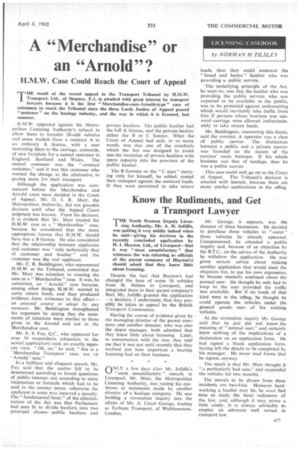A "Merchandise" or an "Arnold"?
Page 91

If you've noticed an error in this article please click here to report it so we can fix it.
H.M.W. Case Could Reach the Court of Appeal
THE result a the recent appeal to the Transport Tribunal by H.M.W. Transport, Ltd., of Stepney, E.1, is awaited with great interest by transport lawyers because it is the first " Merchandise-cum-Arnold-type " case of substance to reach the Tribunal since the three Lords Justice of Appeal passed " sentence " on the haulage industry, and the way in which it is licensed, last summer.
H.M.W. appealed against the Metropolitan Licensing Authority's refusal to allow them to transfer 28-odd vehicles and some trailers from a contract A to an ordinary A licence, with a user restricting them to the carriage, outwards, of new furniture for a named customer in England, Scotland and Wales. The named customer was the "contract customer," and it was this customer who wanted the change as the alternative to paying more for their transport.
Although the application was commenced before the Merchandise and Arnold cases were decided in the Court of Appeal, Mr. D. I. R. Muir, the Metropolitan Authority, did not give.ilis decision until after the Appeal Court judgment was known. From his decision, it is evident that Mr. Muir treated the H.M.W. case as a " Merchandise case, because he considered that the more appropriate licence that H.M.W. should have was a B licence. He also considered that the relationship between applicants and customer was "only technically that of customer and haulier" and the customer was the real applicant.
Mr. C. R. Beddington, who represented H.M.W. at the Tribunal, contended that Mr. Muir was mistaken in treating the case as a " Merchandise "case. It was, he submitted, an " Arnold " case because, among other things, H.M.W. wanted to carry return loads, and they produced evidence from witnesses to this effect— an unusual course to adopt by any measure. Mr. Beddington strengthened his argument by saying that the statements of intention were similar to those given in the Arnold and not in the
Merchandise case. •
Mr. E. S. Fay, Q.C., who appeared for over 50 respondents (objectors in the actual application) took an exactly opposite view. "Oh, no," he said, "this is a Merchandise Transport' case, not an Arnold' case."
In a beilliant and eloquent speech, Mr. Fay said that the matter fell to be determined according to broad questions of public interest; not according to some incantation or formula which had to be said in the correct terms, otherwise the applicant in some way incurred a penalty. The "fundamental basis" of the administration of the Act was that Parliament had seen fit to divide hauliers into two principal classes—public hauliers and private hauliers. The public haulier had the full A licence, and the private haulier either the B or C licence. What the Court of Appeal had said, in so many words, was that one of the mischiefs which the Act was designed to avoid was the incursion of private hauliers with spare capacity into the province of the public haulier.
The B licensee or the "C man" carrying only for himself, he added, costed their transport against the outward loads. If they were permitted to take return
loads, then they could undercut the "bread and butter" haulier who was providing a public service.
The underlying principle of the Act, he went on, was that the haulier who was providing the public service, who was expected to be available to the public, was to be protected against undercutting which would inevitably take traffic from him if persons whose business was outward carriage were allowed indiscriminately to take return loads.
Mr. Beddington, countering this thesis, said the contract A operator was a class of public carrier. The distinction between a public and a private carrier was founded on the nature of the carriers' main business. If his whole business was that of haulage, then he was a public carrier.
This case could well go on to the Court of Appeal. The Tribunal's decision is awaited with interest, because there are many similar applications in the offing.




















































































































































